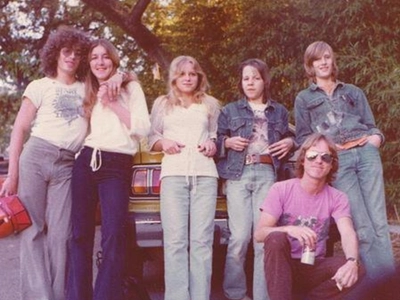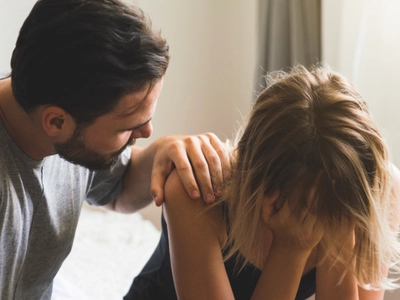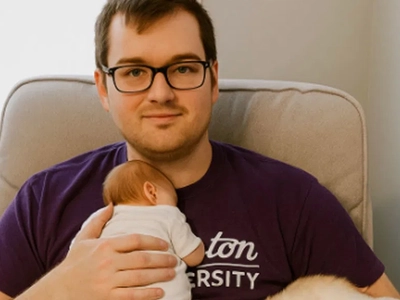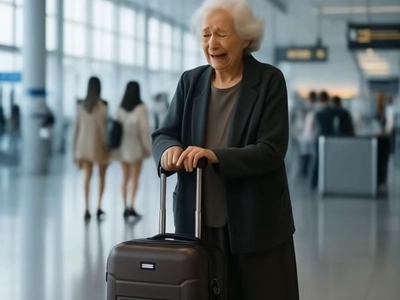I thought I knew what silence was. Not the simple kind, like when the TV is off and the fridge hums and the house settles. I mean the silence that has weight. The kind that sits in a room with you and changes the air. I learned that kind from growing up with my brother, Keane. Being with him made me notice small things other people missed. The quick flicker in his eyes when he was thinking hard. The tiny clench of his jaw when a noise was too loud. The way he lined up his pencils before homework—first by color, then by size, as if the order inside the row could steady the world around it. Living with Keane meant patience. You either grew it like a new muscle or you learned to fake it well enough to get by. For a long time, pretending was the only way I knew how to keep us all moving.
He was diagnosed when he was three, and I was six. I don’t remember the exact day the doctor told us the word, just the days that followed it. Our house got quieter, not peaceful quiet but careful quiet, like we were all holding our breath at once. Mom started moving through rooms like she was looking for something she’d lost and couldn’t name. Dad snapped over things that made no sense to me—crinkling chip bags, cartoons that were barely too loud, the scrape of a chair on the tile. Everyone seemed ready to jump. I learned to make myself small, to slide along the walls and not be in the way.
But Keane stayed Keane. He was gentle and distant, floating somewhere I couldn’t reach but never all the way gone. He smiled sometimes, but not at jokes. He smiled at ceiling fans and drifting clouds and the bright reflections you get when the sun hits a watch face. He didn’t speak. Not then, not for years. We tried picture cards and hand-over-hand signs and a speech therapist who smelled like gum. He still didn’t speak. After a while people stopped asking him questions. They talked around him and about him and over him. I did it too, because that was what the grown-ups did, and I wanted to do it right. I told myself I understood him anyway. I told myself words weren’t everything.
Time moved. I grew up. I left the house and tried on new versions of myself—student, girlfriend, wife, tired person who drinks coffee at strange hours. Mom got sick and Dad’s heart gave up on him. The world we knew narrowed down to hospital rooms and bills and a list of things to handle that never seemed to end. When Mom died, Keane went to a state facility the social worker said was safe. “Structured,” she called it. “Supportive,” she added, like flavoring a hard truth with a gentle word could make it easier to swallow. I visited him, and he sat on a plastic chair and stared at a poster of a forest on a wall that had never seen a tree. He didn’t complain. He never did. He hummed, soft and steady, and I felt small again.
When I found out I was pregnant, I went to see him and brought cookies from Mom’s old recipe. He rearranged them on the napkin by size and stared at my belly without looking at me. I asked if he wanted to come live with us. He didn’t answer. He just gave this small nod with his head slightly down, like he was saying yes to a question that scared him. We set up the spare room that had been a storage cave of boxes and old laundry baskets. Will, my husband, built a bed from a flat-pack and swore not very quietly at the directions. I stuck star stickers on the ceiling even though I knew Keane didn’t care about the idea of night skies; he cared about light, and the way it moved. We bought blackout curtains to help him rest and a soft lamp that made a circle of warm yellow on the floor. We brought him home six months before my due date. He walked in, took off his shoes, and put them side by side under the coat rack so they touched, heel to heel.
Our son, Owen, arrived like thunder and stayed like weather. He was a sweet baby, but he had fire in him. He cried like it was a sport, red-faced and loud, switching from hunger to gas to I-don’t-even-know in seconds. I was tired in a way that doesn’t feel like tiredness. My thoughts came in short pieces, like sentences cut up by scissors. Coffee helped a little until it didn’t. Will picked up extra shifts at the hospital, which meant more money and fewer hands at home. I crossed days off a calendar and told myself this season would pass, because everyone had said that, and I wanted it to be true.
We had routines that were more like scaffolding than a schedule. In the morning I would warm a bottle while bouncing Owen with one foot and answering messages with one thumb. In the afternoon I walked him around the block with a stroller that squeaked when it turned left. At night I tried to sleep in slices and did math about how many more minutes I could have if I skipped washing my hair. Through all of it, Keane was there. He sat in the same corner of the living room, cross-legged, a blanket under him folded to a perfect square. He had a tablet with a pattern app he loved. He’d move shapes around with slow care and fill the screen with sides touching sides and corners touching corners. He didn’t talk, but he hummed under his breath. At first, the sound scraped my nerves. Later, I stopped hearing it most of the time. It became part of the house, like the tick of the clock or the soft whoosh when the heat turned on.
We adjusted to each other. Keane never asked for anything. He ate what I put in front of him and washed his dishes and set them on the rack so every cup handle faced the same way. He folded his clothes like he was packing for an inspection. He went to bed when the lamp turned itself off on a timer. He woke before I did and sat by the window like the sky might drop him a message if he waited long enough. When I had energy, I tried to reach him. I sat on the rug and told him about the baby and how someone’s tiny hand could feel like a whole universe when it wrapped around your finger. He listened with his head tilted and his eyes slightly distant, and I wondered if he heard me or if I was filling the air because I was afraid of what would happen if I didn’t.
Then came the Tuesday. I remember because we had diaper laundry going and the kitchen smelled like reheated pasta and I had reached that edge-of-screaming point where every small thing lands like a punch. Owen had been six months for a week and was in a phase best described as “cute chaos with occasional banshee.” He’d pulled my hair, spit up on a fresh shirt, and cried like his heart was breaking because I dared to pee. Will had left a post-it on the fridge that said he’d be home late. I was a mess. I’d finally gotten Owen to sleep after a long bounce-walk that made my hips ache, and I told myself I had ten whole minutes to be human. I put the baby down, tiptoed to the bathroom, and took the kind of fast shower that feels like a holiday.
I had soap in my hair when I heard it. Not crying. Screaming. The kind that shoots through your chest before your mind catches up. It sounded like “I’m dying,” which is what every mother brain hears even when the actual noise is just “I’m awake again.” I pulled the curtain back, slipped on the tile, grabbed a towel, and ran down the hallway with water still in my ears. I expected chaos. I expected flailing arms and a red face and my own heart banging like a drum.
The house was quiet.
I stopped in the doorway of the living room, and the sight knocked the breath out of me. Keane was sitting in my chair. He had never sat in my chair. Not once in six months. He always used the floor or the edge of the couch closest to the wall. But there he was, shoes off, legs tucked awkwardly, a little folded in on himself. On his chest, Owen slept like he’d always lived there. One of Keane’s hands moved slowly up and down the baby’s back, long gentle strokes I knew by muscle memory. His other arm cradled Owen without squeezing, just enough to keep him safe. Mango the cat was curled on Keane’s knees, her whole body purring so hard I could almost feel it in my teeth.
Keane lifted his face. He didn’t look right at me; he rarely did. He looked through me, which is what he does when he’s focusing and can’t quite land his gaze. When he spoke, it was barely above a whisper. “He likes the hum.”
The words hit me like a door I thought was locked suddenly swinging open. Not just the fact of them. The way he said them. Calm. Clear. Present. My brother, who hadn’t put a full sentence together for years, spoke like a person stepping into the light.
He repeated it, as if I hadn’t heard. “He likes the hum. It’s just like the app. The yellow one with the bees.”
I swallowed tears I didn’t have time for and moved closer. “You mean the one with the lullaby? The bee sound?”
He nodded, small and sure.
That was the beginning of everything changing. I didn’t make a big deal of it in the moment, though my insides were doing cartwheels. I stood there and watched them breathe together. When I reached out to touch Owen’s back, I braced for Keane to flinch, to pull away like he often did when attention landed on him. He didn’t. He stayed steady. I had never seen him so grounded.
Later that day, when Owen woke, I asked Keane if he wanted to hold him again after the next feeding. He nodded. The day after that, I asked if he wanted to try giving the bottle. Another nod. The first time, he held the bottle too straight up, and I showed him how to angle it. He watched my hands, then did it again, exactly the same. We moved like that in tiny steps. By the weekend, I had left them in the living room for twenty minutes so I could sit in the backyard and drink a coffee while it was still warm. The following week, thirty minutes. The week after that, I met a friend for an hour and didn’t shake the whole time. When I came home early in the second month, Keane had not only changed a diaper, he had reorganized the changing table. The wipes were lined up by package color, the creams in a row from smallest to largest, and the diapers stacked with the printed animals all facing the same way.
He started saying more, not stories or opinions but small facts that knit themselves into the day. “The red bottle is leaking.” “Owen likes the giraffe toy more than the lion.” “Mango gets mad when the heat turns off; she moves to the blanket.” I cried more in those two weeks than I had in the year before. Relief sat next to guilt like two people on a couch who don’t like each other but have to share a seat. Will noticed it too. One night he brushed my hair back and said, “It’s like a roommate woke up. It’s amazing.” He was smiling. I smiled too, but my stomach twisted, because it wasn’t just amazing. It was scary.
As he spoke more, I realized how much I had never really seen Keane. I had treated silence like a full stop, like it meant there was nothing left to learn. I had told myself I was doing my best because I wasn’t yelling, because I was feeding him, because I gave him a quiet room. I hadn’t asked what else he might need. I hadn’t tried to meet him where he was. And now that I was trying—now that I was sitting with him, and narrating routines, and handing him the bottle, and trusting him with the baby—I could feel a different kind of weight pressing down. Guilt has sharp edges even when you know you didn’t mean harm. I wished I could go back to that six-year-old and tell her to listen harder. I wished I could go back even one month and start this sooner.
There was a night that pushed everything into focus. It was late, and I had run to Target to get more diaper cream and a pack of sleep suits because Owen kept growing out of things between two breaths. The store was bright and too cold. The aisles smelled like sugar and plastic. I came home with a red bag on my arm and found the house not quiet, not loud, but wrong. Owen was crying from the nursery, a tired cry that said he was awake when he didn’t want to be. Mango scratched at the door. Keane walked, not rocked. He paced in a straight line, his steps even and measured, the way he walked when his mind was full and the world was buzzing in a painful way. His eyes were wide and he kept looking at the floor and then toward the nursery and back again, as if checking a rule he couldn’t remember.
He saw me and said, “I dropped him.”
My heart lurched. “What?”
“In the crib,” he said quickly, the words tumbling and then catching. “I didn’t mean to wake him. I thought—” He stopped and swallowed. “He hit the side. I’m sorry.”
I ran to the nursery. Owen was in the crib, face red, hands flailing, but fine. I checked him from head to toe with that fast, careful touch you learn as a parent. No bump. No bruise. No mark. Just a baby who was tired and mad about it. I picked him up and pressed him to my chest and swayed until the crying thinned to whimpers and then sighs. When I walked back to the living room, Keane was sitting on the edge of the couch with his hands clasped so hard his knuckles were white. He was whispering something over and over.
“I messed up. I messed up. I messed up.”
I sat beside him with Owen tucked against my shoulder. “You didn’t mess anything up.”
He shook his head once, a tiny move. “But I hurt him.”
“No,” I said, gentle but firm. “You made a mistake. A normal one. Everyone does. I have knocked his head with the car door frame more times than I will ever admit out loud.”
He stared at my face like he was trying to decode what I meant. I kept going. “You didn’t break anything. You didn’t fail. You love him. You are careful. He is okay.”
He didn’t move. I put my free hand over his clenched ones. “You’re not broken, Keane. You never were. I just didn’t know how to listen to you.”
He started to cry in a way I had never seen. Not loud. Not gasping. Just deep, quiet sobs that seemed to come from somewhere far back. I wanted to say more, to pour all the words I had swallowed with him over the years into the space between us. I didn’t. We sat together, and the three of us breathed, and the house felt like it had settled onto a new foundation.
In the months after that, the world shifted again, but this time it felt like a soft turning instead of a sudden drop. Keane found a sensory play center across town that took volunteers twice a week. A staff member named Daria met him on his first day. She had short hair and a warm voice that didn’t rush. She showed him the room with the fiber-optic lights and the weighted blankets and the wall of textured panels you could touch without anyone telling you to stop. He liked the corner with the beanbags and the bubble tube that sent streams of air through water, lifting plastic fish in slow dances. He told me, “The green light is too bright if the fan is on. But the blue light is good.” It was the longest sentence he’d said in front of me, and I could hear how carefully he had measured it in his head before letting it out.
He went on Tuesdays and Thursdays. He took the bus at the same time each morning and stood at the stop with his hands folded in front of him. The first week, I watched from the front window like he was going to fall off the curb. The second week, I sat on the steps with Owen in my lap and waved when Keane turned the corner. By the third week, I forgot to hover, and when I realized it, I felt something uncoil in me. On the days he volunteered, he came home with tiny bits of glitter on his sleeves and stories that were really observations. “The girl in the red shirt likes the swings if you count to ten.” “The boy with the blue shoes only smiles when the water table is on.” “Daria puts the big blocks in the bin. The small blocks go on the shelves.” Some days he didn’t say anything at all, but he looked taller, like approval had added inches to his spine.
At home, our lives took on new rhythms. Owen’s first word wasn’t “Mama” or “Dada.” It was “Keen.” He said it one morning in the kitchen while Keane wiped the table with slow circles, and I had to sit down because my knees suddenly didn’t trust the floor. Will whooped, and Mango fled under the couch because she doesn’t like loud joy. We pretended not to watch as Owen said it again and again, like he was testing the sound and finding it good. After that, it seemed like the house itself learned new words. Patience. Routine. Help. None of them magic in the way movies make progress look, but all of them powerful in a real, quiet way.
There were still hard days. If Owen got sick, the whole place felt like a tilted board, and all the pieces slid toward panic. Sometimes Keane would shut down when the dishwasher beeped in the middle of a thought, and I’d have to put my hand on his shoulder to bring him back. Sometimes I snapped, not even at anyone in particular, and then cried from the shame of it later. Will and I fought over things like who forgot to buy diapers and who had more sleep and who loved who in the right way, which is a fight you can’t win because love isn’t a math problem. But this time the hard didn’t swallow the good. The good had weight now. It held.
We built small rituals that steadied us. Sundays were pancake mornings. Keane liked to measure the batter with the kind of attention people usually reserve for surgery. He’d scrape the cup level with a knife and pour the milk along a line on the measuring glass that he checked twice. He made three small pancakes and one big pancake every time because that was the pattern that felt right to him. Owen sat in his high chair and banged a spoon like a tiny drummer. Mango prowled underfoot, pretending she owned the kitchen. We ate together at the table, and sometimes Keane would reach across and wipe syrup off Owen’s chin with a napkin without making a big deal out of it. It was such a normal gesture that it felt like a miracle.
We added a bedtime routine that Keane claimed as his job. After bath, he took the yellow bee app off the tablet and set it on the dresser. He hummed with it. The two sounds braided together in the air and turned the room softer. He held Owen sometimes, or he stood near the crib with his hand on the rail and swayed in place, eyes half closed, like he could feel the music in his bones. I watched from the hall the first few times and cried without wiping the tears, because I didn’t want to blur the sight with my hands. After the first week, I stopped watching, because trust is a kind of love too, and you show it by not checking every two minutes.
We fought the world together in small, practical ways. The forms at the play center were wrong and called him a “patient,” and I made a calm fuss until they changed it to “volunteer.” The bus driver on Route 6 seemed to think a grown man who didn’t make eye contact was a child, and I wrote an email that made me blush when I re-read it later, but it worked. Neighbors who had only ever seen Keane as the quiet guy who lived with me started saying hello. Mrs. Patterson from across the street brought over banana bread and asked him to help her line up her recycling bins, because she’d “heard he was good at order.” He lined them up with the wheels facing out, and she clapped like a child, and he tilted his head with a small question in it, like he wasn’t sure whether clapping was the right response, but he liked being asked.
On bad weather days, we turned the living room into a playground. We made a tunnel from couch cushions and a blanket, and Owen crawled through it with a squeal. Keane timed him, counting slow and steady. “One, two, three,” he’d say, and then pause, waiting for Owen to pop out the other end. He didn’t rush the numbers. He never rushed anything. He showed me that waiting can be its own kind of care.
Sometimes we talked about our parents. Not long talks. Small pieces. I told him what I remembered about Dad’s laugh before it got tight and how Mom would stir soup and sing under her breath. He sat with his hands on his knees and listened. One night, he said, “Mom moved fast. But her hands were soft.” It was the first time he had given me a summary of her that was his, not mine, and I held the sentence like a gift. Another night, out of nowhere, he asked, “Why did Dad hate bags?” I laughed the kind of laugh that tastes like salt because it hurts. “They were loud,” I said, and he nodded like that explained everything, though of course it didn’t.
I learned new things about listening. You can listen to words, or you can listen to the shape a body makes when it stands in a doorway. You can listen to how someone lines up cups in the cabinet. You can listen to a hum and hear comfort. You can listen to silence and realize it isn’t empty; it’s full of decisions, and effort, and hope. I had spent years thinking I was good at listening because I could be quiet. What I learned was that real listening is active. It is attention plus curiosity plus the humility to know you might be wrong.
Sometimes at night, when the house was finally still and the dishwasher was the only sound, I would sit in the dark and let the day replay. The Tuesday in the chair. The first “He likes the hum.” The Target night with the almost-accident that turned into a lesson about being human. The tiny glances and nods that built a bridge from his world to mine. I would picture us on that bridge, not all the way on one side or the other, but meeting in the middle, hands open, not trying to push or pull, just standing. It made me feel both strong and fragile. It made me grateful in a way I can’t put in fancy words.
On the day Owen turned one, we had a little party with a cake that was more frosting than cake. Will put up a string of paper stars. Our neighbor kids came over and put fingerprints on every surface. Mango hid in the laundry basket. When it was time for the candle, the room got quiet with the kind of hush that isn’t heavy, the kind that holds a breath because joy is landing. I looked at Keane. He was standing near the wall, not too close to the noise, but not far. His eyes were on Owen. When we sang, he didn’t sing, but he hummed, and I could hear the faint echo of the bee app tucked inside his sound. After Owen smeared frosting on his face and tried to touch every adult with sticky hands, he lifted both arms toward Keane and said, clear as a bell, “Keen.”
I don’t think I will ever forget the way Keane’s mouth softened around his smile. He stepped forward and took Owen under the armpits and lifted him with the smoothness of practice. He pressed his cheek to Owen’s hair and closed his eyes. I caught Will’s gaze across the room, and he had that look again, the one from the beginning, the roommate waking up. But this time there was no fear mixed in, only pride and something like awe.
When friends ask how we did it—how we moved from that quiet, careful house to this noisy, careful one—I never know what to say. We didn’t do a single big thing. We did a hundred small things, and we did them again and again. We trusted that the small things matter. We watched for signs and we tolerated mess and we took turns being the steady one. We made room for humming. We let order help us, but we didn’t worship it. We forgave mistakes out loud. We told the truth when we were tired. We made space for Keane to be a person, not a puzzle. We learned that love isn’t fixing. Love is seeing.
Every so often I catch myself on the edge of the old habits. I start to speak for Keane because I think it’s faster. I start to make a decision without asking what he wants because it looks easier. On those days, I try to slow down and look at the details the way he does. I ask, “Do you want the blue cup or the green cup?” I say, “We could go now or we could go in ten minutes; you tell me.” I show him the plan for the day instead of telling him the plan. It turns out adult life has picture cards too; they’re called lists. We pin one to the corkboard by the door and check things off with a pen that lives on a string so it doesn’t wander.
The last time we visited the state facility for a paperwork thing, Keane waited in the car with Will while I went inside. The place smelled the same, like bleach and something sweet trying to hide the bleach. The poster of the forest was gone; in its place was a laminated sheet with rules printed in block letters. I signed my name on a form and left. In the parking lot, Keane stood outside the car with his hands in his pockets, rocking on his heels in a tiny motion that you would miss if you weren’t looking. He said, “The air is loud here.” We got in the car, and I said, “Let’s go home.” We drove with the windows down, and the real air moved around us, warm and busy with summer.
On Tuesdays now, when he leaves for the bus, he taps the doorframe as he goes out. It’s a habit he invented without telling us what it means. I watch him walk down the sidewalk in his clean sneakers, shoulders back, head steady. I think about the boy who lined up pencils by color and size and the man who lines up wipes by package color and the person who sees order not as a cage but as a ladder. I think about the baby who cried like a storm and now points at pictures and says “bee” and “light” and “Keen” with equal joy. I think about how close we all came to missing this, not because we didn’t love each other, but because we loved each other in the wrong direction.
If you had asked me years ago whether a single sentence could change a life, I would have said no. People change over time, not in moments, and mostly because life wears them into new shapes, like water on stone. I still believe that. But I also believe in sparks now. I believe a small, true sentence can light a path you didn’t see before. I believe a whisper can be a lantern.
He likes the hum.
Those words took the shape of a bridge for us. They taught me to stop filling the air and start listening to the sound that was already there. They taught me that the help someone needs isn’t always the help you planned to give. They taught me that silence can be full of information if you have the patience to hear it.
Sometimes I sit in my chair—the chair that became our chair that one Tuesday—and I lean back and close my eyes and think about the way our family sits now. Not the picture-perfect version, not the staged one for a holiday card. The real one. Will asleep on the couch with a book on his chest because the hospital won this round. Owen on the floor with blocks scattered like a map of a city he hasn’t built yet. Mango in the patch of sun by the sliding door, dreaming of ownership. Me with a cup of tea that I will forget to drink while it’s hot. Keane in the corner, not apart from us but holding his space inside ours, humming under his breath, the sound low and steady. The room is not quiet in the old way. It’s full and warm and alive. The silence I thought I knew has turned into something else—steady, generous, made of trust.
People sometimes ask, “So, do you think moments like that really change everything?” I don’t know how to answer in a way that fits neatly in the kind of conversations we have in grocery store lines or on front porches while kids run in circles. I want to tell them it wasn’t a miracle, but it was also a miracle. I want to say that we changed everything and that everything changed us and that somehow both of those are true at the same time. I usually say, “It changed enough,” because that is simple and honest, and they nod like they understand. Maybe they do. Maybe they have their own versions of humming, their own Tuesdays, their own chairs.
If this story is anything, it’s a reminder to look again. To listen once more, a little slower. To trust that love can learn. To know that people can wake up in front of you if you give them a place to land. To believe that the smallest, softest sentences sometimes carry the most weight. And to remember that hope doesn’t always show up as a bright flash. Sometimes it sounds like a hum in the corner of a living room, steady and strong as a heartbeat, telling you that you are already home.






